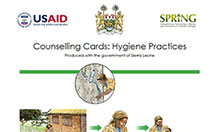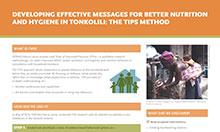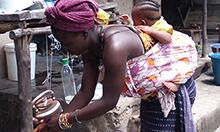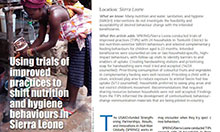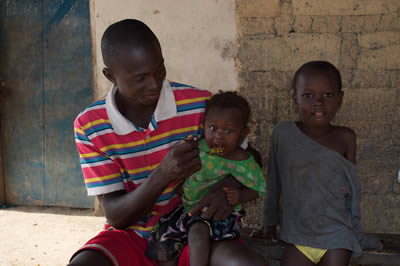
Many water, sanitation, and hygiene (WASH) and nutrition interventions rely on households changing their behaviors without much discussion around why and how behaviors should be adopted, or how they affect specific members of a household. One way of improving adoption of select behaviors is to allow families to select from a set of evidence-based behaviors that are feasible and acceptable to them, rather than having implementers preselect the behaviors for them.
In May-June 2016, SPRING used Trials of Improved Practices (TIPs), a qualitative research methodology, to allow household members in the Tonkolili district of Sierra Leone to select improved WASH and nutrition behaviors for trial in their households.
The TIPs approach provides an opportunity to pretest behaviors at the household level before they are widely promoted. By focusing on behavior—what people do—rather than on knowledge—what people know or believe—TIPs provides an in-depth understanding of families' preferences and capabilities, as well as the barriers and enablers they encounter when they try new behaviors.
SPRING/Sierra Leone conducted TIPs research with 24 selected households in two chiefdoms in Tonkolili. Over a series of three visits with each household, TIPs facilitators proposed a “menu” of targeted nutrition-sensitive WASH and complementary feeding behaviors to each household and helped participants identify the behaviors that they would be willing to test and adopt. Through these discussions, the facilitators learned how households navigate changes in their behaviors and what factors contributed to behavior change.
Creating handwashing stations and prioritizing consumption of colorful fruits and vegetables, which are rich in vitamin A, as complementary foods were among the most acceptable behaviors to the households in the study. At the end of the study, the number of participants who planned to continue using handwashing stations surpassed the number that had initially said they were willing to try it, as three additional households had elected to construct tippy taps after seeing their neighbors use one. The most common reasons that individuals gave for adopting this behavior were that TIPs team members explained the behavior and construction to participants in their home and that the materials (large water bottles and a nail) needed to construct the simple handwashing stations were readily available.
Participants were quite willing to prioritize consumption of colorful foods—such as mangoes, bananas, and pineapple, among others—because they said it would be relatively easy to teach young children to consume these foods, just as they had taught them to consume rice or porridge. Among the participants who were successful in adopting the practice, one major facilitating factor cited was the high availability of fruits such as mangoes.
One behavior that was not accepted by any household was keeping small children in a clean, enclosed area to prevent them from coming into contact with human and animal feces that could make them sick. At a follow-up visit, none of the participants who said they were interested in building a fenced-in play area had done so. When asked why they were not successful with adopting the behavior, many participants said that children were not used to having their movement restricted. Despite initial interest, participants expected that this was not a familiar or appealing behavior to the children and that they would cry. The team concluded that the main reason the household found the behavior unacceptable was a perception of negative consequences (that babies would cry or be very unhappy if their movements were restricted in such a way). Many households preferred to continue the practice of periodically sweeping the home environment to prevent children from coming into contact with feces instead of enclosing the child.
These reactions provide important information for designing any WASH or nutrition intervention. Because evidence suggests that creating clean play spaces for children that are free feces is a high priority behavior for improving nutrition, SPRING will use this information as we continue to investigate how to further contextualize suggested behavior and adapt it to make it more acceptable to households.
SPRING/Sierra Leone plans to use the results from the TIPs research and other complementary research initiatives to inform the development of a social and behavior change strategy that will guide the WASH and nutrition activities implemented by SPRING/Sierra Leone and collaborating local partners.
